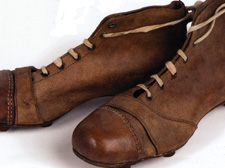|
|
 |
| |
 pre-war boots pre-war boots |
The curios case of Hunter Davies
Whether it’s tax discs, telegrams, pottery or postcards, there
lurks a collector in all of us, discovers Dan Carrier
When his knees finally gave way and writer Hunter Davies had to quit playing Sunday morning football for kick-about team Dartmouth Park United, he needed something to fill the void. He found his answer in a hobby that came naturally – he became a “collector”.
In his latest book, which outlines the thrills and frustrations of gathering curios, Hunter explains how it happened: “I must take up something else, I told myself, something that won’t do my knees in and that will get me out of the house, and will be a harmless distraction.”
He recalled how he had enjoyed collecting stamps as a boy, so he thought he’d take it up again.
“As a boy I collected stamps and football cards, but stopped as adulthood beckoned. Then, aged 40, I began to collect again. I had accumulated lots of things and I wanted to add to them.”
The collecting world is divided into two camps, he says.
“There is the serious collector, who goes out of their way and actively searches for items.
“Then there is the accumulator, a much more passive beast. He or she accumulates by never knowingly throwing things away.
I have always been like that.”
And Hunter has another reason for keeping even the smallest document. He has a “museum” dedicated to himself in a series of dusty boxes.
Inside he has such rare artefacts as rejection letters from newspapers when he was a rookie reporter, a telegram announcing the birth of his first child, a builder’s estimate for a new kitchen from 1963 and even scraps of carpet and wallpaper that he has replaced in his home over the years.
Frustratingly, the “museum”, which was started in the late 1960s, is far from complete. “I wish I’d started that one earlier,” he rues.
“I got the idea from the artist Peter Blake,” he recalls. Blake, the man behind the famous Beatles Sergeant Pepper album cover, had something he called the Museum of Myself.
“It was a framed collection of personal objects,” recalls Hunter.
“Of course it’s completely self-regarding and appallingly self-obsessed and really only of interest to me – but that’s just what it’s meant to be.”
Hunter’s collecting eye ranges over a number of seemingly unrelated topics: many are linked directly to his personal interests, namely football, the Beatles and the Lake District – areas he has written widely on.
Others are more esoteric. He has postcards of Hampstead Heath, and a collection relating to the suffragettes, which sits next to prime ministers’ autographs and Portuguese pottery.
“Anything is collectible,’ he says. “And it is vital to remember that it does not have to be valuable.”
An example of this is Hunter’s collection of car tax discs: he has saved them from every car he has owned.
“They are of no value at all and people do not trade in them,” he says. “But they are interesting looking and they change subtly each year.”
While such a pastime may seem strange, Hunter is by no means alone in his hobby.
“One third of the population collect things,” Hunter says. “They have a stash of old marmite jars somewhere or favourite rubbers from their school pencil cases.”
And he believes Britain as a nation of collectors has taken on a new lease of life in recent years.
“The rise of the car boot sale 30 years ago meant people could sell off their old junk – and potter about buying other peoples,” he says.
This has been augmented by the rise of online trading on sites such as eBay and the continuing popularity of TV programmes such as the Antiques Roadshow.
But browsing through tables laden with other peoples junk is all part of the fun. Hunter went to a fair at Alexandra Palace at the weekend and was astonished by the crowds.
“It boasted 900 stalls and you had to park some distance away and take a shuttle bus,” he says. “There is, of course, a lot of money to be made in collecting the right things – but personally I have never sold anything.”
And while Hunter can point to his own bizarre collections, there is always some one with an even quirkier stash.
Hunter cites a friend of his. “He collects airline sick bags. And he is not alone: there is actually a society of people who collect airline sick bags.
“Trust me: there will be someone out there who collects every copy of the Camden New Journal.”
•
|
 |
|
|
 |
 |
|
 |
|
 pre-war boots
pre-war boots
